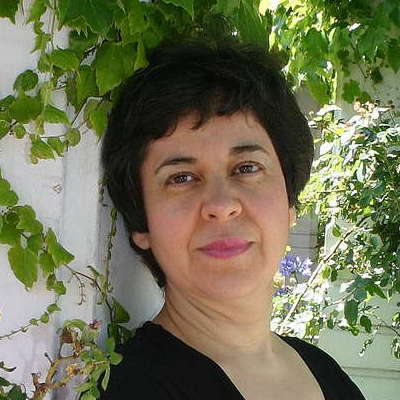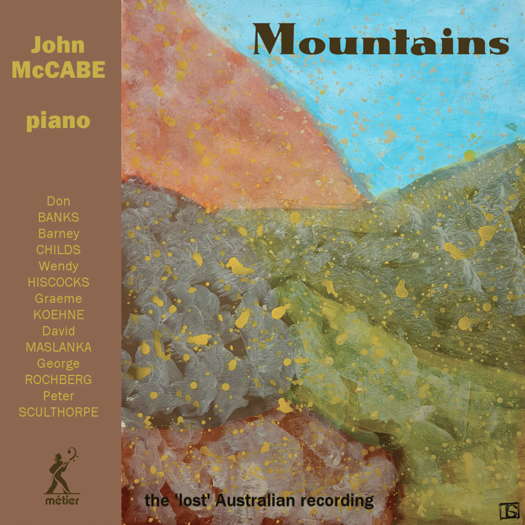 FEEDBACK: She said WHAT? Read what people think about our Classical Music Daily features, and have your say!
FEEDBACK: She said WHAT? Read what people think about our Classical Music Daily features, and have your say!
- Tamerlano
- wind music
- Alexandre Dumas
- Prospero Classical
- Michael Brewer
- Joseph Rheinberger
- Amir Mahyar Tafreshipour: The Doll Behind The Curtain
- Hoddinott Hall
 SPONSORED: A Seasoned Champion of New Music. Argentinian-American pianist Mirian Conti in conversation with Andrew Schartmann.
SPONSORED: A Seasoned Champion of New Music. Argentinian-American pianist Mirian Conti in conversation with Andrew Schartmann.
All sponsored features >>


A Deep Understanding
John McCabe's 'lost' Australian recording,
commended by GEOFF PEARCE
commended by GEOFF PEARCE
The story behind how this CD came to be is quite fascinating, and is told in the accompanying programme notes. Needless to say, these treasures, recorded in 1985, could have easily been lost were it not for one of the composers on the CD, Wendy Hiscocks, and the pianist's wife, Monica McCabe.
I was initially familiar with John McCabe as a pianist, before I knew of him as a composer, especially for his landmark recording in the 1970s of the Haydn Piano Sonatas. Very few people were playing these at this time, and McCabe's recording raised a lot of interest. I heard that he was also interested in performing works by twentieth century composers, so I looked forward to the release of this disc with considerable interest.
In Mountains, dating from 1981, by Peter Sculthorpe, the two outer sections, quite sombre and monumental, frame a middle section which is quicker, more flowing and impassioned. This interesting work is performed here by someone who has a deep understanding of this music and a sense of pace.
Listen — Peter Sculthorpe: Mountains
(track 1, 3:00-3:46) © 2019 Divine Art Ltd :
The short, virtuosic Toccata (1983) by Wendy Hiscocks, a Sculthorpe student, uses a lot of repeated notes, flashes of percussive rhythm and a melodic movement based on particular intervals. Once again, the pianist brings out the essence of this work.
Listen — Wendy Hiscocks: Toccata
(track 2, 2:17-2:54) © 2019 Divine Art Ltd :
The lovely Piano Song, full of quiet beauty and simplicity, was written in 1978 by American composer David Maslanka. An impassioned section subsides into a sublime melody which transports your mind into a very quiet still place. This is performed with a beautiful legato line and very sensitive playing. Not surprisingly, it was written for this pianist.
Listen — David Maslanka: Piano Song
(track 3, 2:16-2:57) © 2019 Divine Art Ltd :
The contribution from Don Banks, a close friend of the pianist, first published in 1956, is entitled Pezzo Dramatico. It has two faster sections framing a slower elegiac middle section. Whilst the music is serial in nature, it is certainly not forbidding, and is interesting to listen to - especially with the changes of mood and texture, and this is significantly enhanced by McCabe's lively and committed playing.
Graeme Koehne is a favourite composer of mine, and I have been familiar with his music for a long time. Twilight Rain is heavily influenced by impressionism, and by Debussy in particular. For me, it's a wash of muted colours with the occasional sparkle. It would not be an easy work to perform as there is no real pulse, and the performer needs to keep a firm idea of direction or it could so easily bog down. Once again John McCabe interprets this work with real understanding.
Listen — Graeme Koehne: Twilight Rain
(track 5, 4:51-5:29) © 2019 Divine Art Ltd :
The largest work here, a suite of five pieces by American composer George Rochberg, is entitled Carnival Music. The composer was wrestling with the problems and difficulties of writing serial music, a technique that he would later all but abandon. This suite, however, is full of contrast, and this is one of the things giving the work cohesion, by its juxtaposition of opposites.
The opening, 'Fanfare and March', is one such section, full of colour and abrupt juxtapositions. The pianist is certainly able to keep the listener entertained by deftly changing character as the music calls. There is an interesting reference here which I'm sure is a snatch from Petrushka, paying homage to another master of abrupt juxtaposition.
Listen — George Rochberg: Fanfare and March (Carnival Music)
(track 6, 2:37-3:34) © 2019 Divine Art Ltd :
'Blues' ambles along, and one feels sure that one has heard this work before, even though, in my case, I definitely haven't. The heartfelt 'Largo doloroso', chromatic and mysterious, moves slowly in the shadows. It conjures up a feeling, at least to me, of bereavement. 'Sfumato' takes up where the previous movement left off, moving faster. It is quite nebulous, like seeing objects emerging from a thick fog.
The last movement, 'Toccata-Rag', is quite odd, with a gentle and swinging ragtime interspersed with a more aggressive section, described in the notes as a 'player piano' tune. After a return to the first movement fanfare and a final blues reference, the work closes with a final ragtime flourish. This movement epitomises McCabe's performances throughout the disc - insightful, virtuosic when needed, and with a fine cantabile touch and committed playing that brings out the best in whatever he has to play.
Lastly, Heaven to clear when day did close (1980) by American composer Barney Childs, is dedicated to two pianists, the performer being one of them, and is named after a line from a Ben Jonson poem. Overall the mood is quiet, except for a very brief jazz-inspired section, and after a series of chords, the melodic line leads us into light-filled infinity.
Listen — Barney Childs: Heaven to clear when day did close
(track 11, 6:42:7:31) © 2019 Divine Art Ltd :
This is a disc with a great deal to commend it for any listener who wants to venture off the well-trodden path. The music is unfamiliar, but interesting, full of surprises and variety, and the fine piano playing is insightful and committed.
Sydney, Australia


